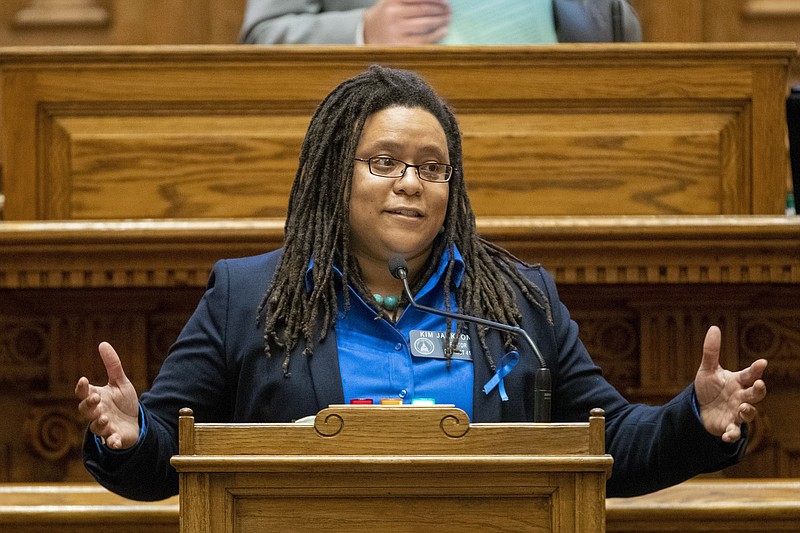ATLANTA -- A bill banning most gender-affirming surgeries and hormone replacement therapies in Georgia for transgender people under 18 is headed to Gov. Brian Kemp's desk after senators gave it final passage on Tuesday.
Senators voted 31-21 along party lines with Republicans pushing through Senate Bill 140, despite impassioned pleas from Democrats and LGBTQ advocates against what has become the most fiercely contested bill of Georgia's 2023 legislative session.
It's part of a nationwide effort by conservatives to restrict transgender athletes, gender-affirming care and drag shows. Governors in Mississippi, Utah and South Dakota have signed similar bills. Missouri's Senate on Tuesday advanced a pair of bills to prohibit gender-transitioning health care treatments for minors and restrict them from competing in sports.
Andrew Isenhour, a spokesperson for Kemp, wouldn't say whether the Republican governor would sign the bill into law. Opponents said they believe the bill would be an unconstitutional infringement on parents' rights, and the American Civil Liberties Union of Georgia threatened Tuesday to sue if the bill becomes law. Judges have at least temporarily blocked laws limiting the treatment of transgender youths in Arkansas and Alabama.
Doctors would still be able to prescribe medicines to block puberty under the Georgia bill, but Republicans say restrictions on other treatments are needed to prevent children from making decisions they will regret later.
"I think we have struck a good balance here," said Republican Sen. Ben Watson, a Savannah physician who helped draft the measure. "What we're doing is preventing minors, who are under 18 years old, from having irreversible changes in their lives."
MISSOURI BILLS ADVANCE
The Missouri Senate advanced a pair of bills to prohibit gender-transitioning health care treatments for minors and restrict them from competing in sports, a hard-fought GOP win Tuesday following intense pressure from protesters to act.
The Senate votes came after an all-night session of closed-door negotiations and only after Republican lawmakers agreed not to prohibit transitions already in process and to let the measures expire in 2027.
Wyoming on Monday became the 19th state to ban transgender athletes from playing on girls' or women's sports teams after the Republican governor opted not to veto the legislation.
Democratic Gov. Laura Kelly last week vetoed a Kansas bill to ban gender-affirming care for transgender minors, setting up a hotly contested fight in the Republican-controlled Legislature to override her.
At least seven states have already enacted restrictions or bans on such care: Alabama, Arkansas, Arizona, Mississippi, Tennessee, Utah and South Dakota.
Missouri's GOP senators compromised by agreeing to allow minors already receiving hormone treatments or puberty-blocking drugs to continue to do so, applying that ban only to those who had not yet started them.
Health care providers who perform a gender-transition surgery or otherwise prescribe "cross-sex hormones or puberty-blocking drugs" to minors could have their medical licenses revoked and face potential lawsuits from their patients until they reach age 36. Republicans initially proposed a 30-year window for lawsuits.
Information for this article was contributed by Jeff Amy, Summer Ballentine and David A. Lieb of The Associated Press.
 State Sen. Carden Summers, R-Cordele, speaks to activists opposing SB 140 before the bill gets final approval at the Senate in Atlanta on Tuesday, March 21, 2023. SB 140, sponsored by Summers, would prevent medical professionals from giving transgender children certain hormones or surgical treatment. (Arvin Temkar/Atlanta Journal-Constitution via AP)
State Sen. Carden Summers, R-Cordele, speaks to activists opposing SB 140 before the bill gets final approval at the Senate in Atlanta on Tuesday, March 21, 2023. SB 140, sponsored by Summers, would prevent medical professionals from giving transgender children certain hormones or surgical treatment. (Arvin Temkar/Atlanta Journal-Constitution via AP) Jennifer Bowie, center left, and Aaron Baker, center right, become emotional while watching discussion of SB 140 on a video monitor in the Capitol before it gets final approval at the state Senate in Atlanta, Tuesday, March 21, 2023. SB 140 would prevent medical professionals from giving transgender children certain hormones or surgical treatment. (Arvin Temkar/Atlanta Journal-Constitution via AP)
Jennifer Bowie, center left, and Aaron Baker, center right, become emotional while watching discussion of SB 140 on a video monitor in the Capitol before it gets final approval at the state Senate in Atlanta, Tuesday, March 21, 2023. SB 140 would prevent medical professionals from giving transgender children certain hormones or surgical treatment. (Arvin Temkar/Atlanta Journal-Constitution via AP) Christine Cox, center, a parent of a transgender teenager, becomes emotional after speaking to state Sen. Carden Summers, R-Cordele, rear left, outside the Senate at the Capitol in Atlanta on Monday, March 20, 2023. Activists appeared at the Capitol to protest SB 140, a bill sponsored by Summers that would prevent medical professionals from giving transgender children certain hormones or surgical treatment. (Arvin Temkar/Atlanta Journal-Constitution via AP)
Christine Cox, center, a parent of a transgender teenager, becomes emotional after speaking to state Sen. Carden Summers, R-Cordele, rear left, outside the Senate at the Capitol in Atlanta on Monday, March 20, 2023. Activists appeared at the Capitol to protest SB 140, a bill sponsored by Summers that would prevent medical professionals from giving transgender children certain hormones or surgical treatment. (Arvin Temkar/Atlanta Journal-Constitution via AP)
